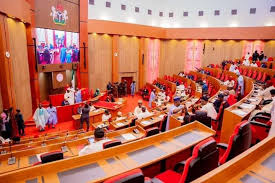For the second time this year, Nigeria’s Senate and House of Representatives have approved an extension of the capital component of the 2024 national budget to December 31, 2025. The extension has sparked renewed criticism from economists, financial experts, and the organised private sector who view the move as a reflection of weak budget execution capacity and a threat to fiscal discipline.
During its plenary session on Tuesday, the Senate passed an amendment to the 2024 Appropriation Act following a presentation by Senator Olamilekan Adeola, Chairman of the Senate Committee on Appropriation. The House of Representatives also passed the bill for second reading, with Deputy Majority Leader Ibrahim Halims leading the debate.
The new timeline extends the capital expenditure window for a full additional year. It is the second such extension, after an earlier shift from December 31, 2024, to June 30, 2025, which was based on a request by President Bola Tinubu. That extension, granted by both chambers, was aimed at allowing the government to complete several ongoing infrastructure projects.
Deputy Senate President Barau Jibrin, who presided over the Senate session, confirmed the passage of the amendment after an accelerated consideration. Speaker of the House of Representatives, Tajudeen Abbas, also stated that the extension was necessary due to the low level of capital implementation recorded thus far in the 2024 budget.
Senator Adeola said the federal government lacked adequate funds to implement all proposed expenditures in the 2024 fiscal year, and warned that without an extension, many government projects risked being abandoned. He argued that extending the implementation period would ensure the continuity of key projects.
However, the decision has drawn widespread criticism. Critics argue that Nigeria now operates two capital budgets in one fiscal year—2024 and 2025—creating a complex situation for monitoring, transparency, and financial discipline.
According to a source at a federal ministry who spoke off the record, implementation of the 2025 national budget, which is legally in effect, has not commenced, nearly seven months into the year. The source revealed that all operational and financial activities in the ministry were still being run under the 2024 budget, resulting in delays in contractor payments and unpaid staff allowances.
“The 2025 budget implementation hasn’t started. All of our expenses from January to now have been based on the 2024 budget. Even duty travel allowances for this year haven’t been paid,” the official said.
Director of Press and Public Relations at the Office of the Accountant General of the Federation, Bawa Mokwa, confirmed that capital funds from the 2024 budget were recently released to some ministries. He added that the 2025 budget would only commence once the capital segment of the 2024 budget is closed.
Economists have warned that the pattern of repeated budget extensions signals deeper issues within Nigeria’s fiscal management framework.
Renowned economist Ayo Teriba described the development as “habitual” and financially unsustainable. “You don’t need 24 months to execute a 12-month budget. There is simply no money. This practice must stop,” he said.
Paul Alaje, Chief Economist at SPM Professionals, warned that running two capital budgets simultaneously could raise the money supply and spike inflation. He called for a clearer forecast model and better planning to ensure fiscal predictability.
Professor Akpan Ekpo said the extension reflects a failure in economic forecasting and warned that it could derail economic growth and worsen stagflation. “Two budgets running at the same time is an embarrassment, given our expertise,” he said.
Dr Muda Yusuf, CEO of the Centre for the Promotion of Private Enterprise, noted that Nigeria’s capital budget performance has always been poor due to weak revenue performance, especially in oil earnings, and unrealistic budgetary assumptions. “Debt servicing is also taking a heavy toll on the fiscal space,” he added.
Dr Aliyu Ilias, a development economist, said the extension sets a “dangerous precedent” and could create loopholes for duplication and corruption in project execution. He stressed the need for transparency and adherence to budget cycles.
Despite the concerns, some industry stakeholders have welcomed the extension. National Vice President of the Nigerian Association of Small-Scale Industrialists, Segun Kuti-George, said the decision would allow the government to complete important capital projects and stimulate economic activity through infrastructure development.
“Extending the capital component of the 2024 budget is a positive development. It allows the government to finish what it started. That, in itself, can boost investor confidence and development,” he said.
Nevertheless, the broader economic implications remain a concern. Experts agree that future budgets must be better planned, more realistically funded, and implemented within their designated timeframes to improve economic outcomes and restore fiscal credibility.
